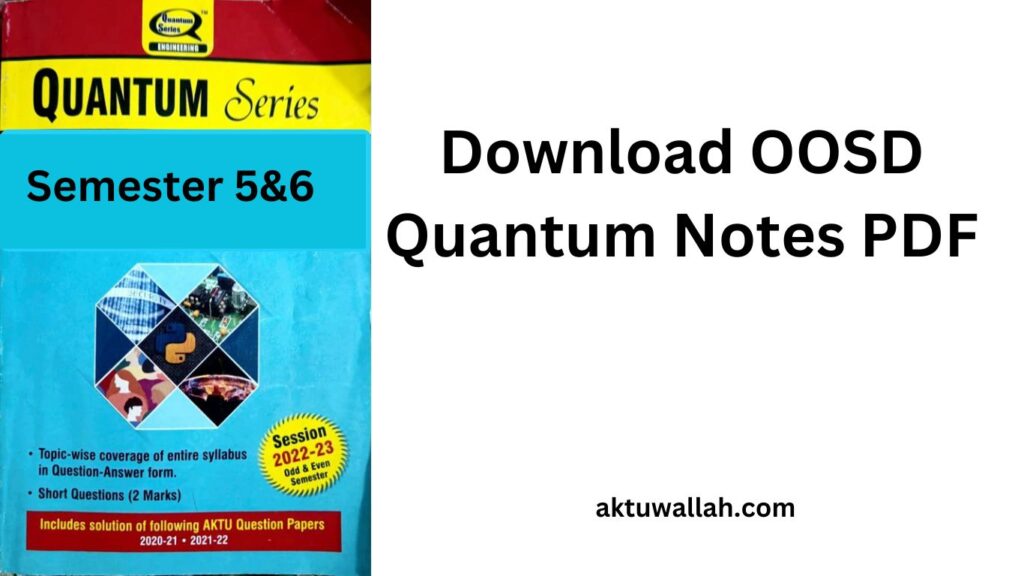Download OOSD Quantum Notes PDF For B-tech CSE Branch:
In this article, we’ll explore the world of Object-Oriented System Design (OOSD) and the importance of quantum notes in the B-Tech Computer Science and Engineering (CSE) curriculum. We will also provide you with valuable insights into key topics and syllabus details related to Object-Oriented System Design.
How to Download OOSD Quantum Notes PDF
Downloading OOSD Quantum Notes PDF is a straightforward process. They are readily available online and can be easily accessed through various educational platforms. Just click on the given link to get it.
Download Now
Download OOSD syllabus 2023-2024. Click Here
Download AKTU 3rd year quantum PDF. Click Here
Download 3rd year handwritten notes PDF. Click Here
Download CSE 3rd year PYQ. Click Here
Introduction to Object-Oriented System Design (OOSD)
Object-Oriented System Design, commonly known as OOSD, is a fundamental aspect of the B-Tech CSE curriculum. It’s a subject that lays the foundation for students to understand how to design software systems using object-oriented principles. It’s an essential skill for any aspiring computer scientist or engineer.
Why OOSD Matters in B-Tech CSE
OOSD equips students with the necessary skills to design software that is not only efficient but also maintainable. It encourages students to think in terms of objects, classes, and their interactions. This approach leads to better software quality, which is a crucial requirement in the industry.
Quantum Notes: A Game Changer
Quantum Notes are a revolutionary way of studying and understanding complex subjects like OOSD. These notes are designed to provide a quantum leap in your learning experience.
Benefits of Quantum Notes in B-Tech CSE
Enhancing Learning
Quantum Notes provide concise and well-structured information that enhances the learning process. They break down complex topics into easily digestible sections.
Time Efficiency
For busy B-Tech CSE students, time is of the essence. Quantum Notes save time by presenting only the most relevant information, allowing for efficient study sessions.
Comprehensive Understanding
Quantum Notes cover the key concepts of OOSD comprehensively. They ensure that students grasp the fundamental principles of object-oriented system design.
Key Topics in OOSD Quantum Notes:
OOSD comprises several key topics that are essential for a thorough understanding of the subject. These include:
Inheritance
Inheritance is the process by which one class inherits the attributes and methods of another class. It’s a fundamental concept in OOSD.
Polymorphism
Polymorphism allows objects of different classes to be treated as objects of the same class. It simplifies code and makes it more extensible.
Abstraction
Abstraction involves simplifying complex reality by modeling classes based on relevant characteristics.
Encapsulation
Encapsulation is the bundling of data and methods that operate on that data into a single unit, known as a class.
Design Principles
OOSD also covers essential design principles that guide the creation of efficient and maintainable software systems.
OOSD Syllabus Breakdown
Semester-wise Overview
The (Object-Oriented System Design) OOSD syllabus is typically divided into different semesters, each building upon the knowledge gained in the previous one.
Course Modules
The syllabus includes various modules that delve into the specific aspects of OOSD, ensuring a comprehensive understanding of the subject.
Preparing for OOSD with Quantum Notes
Studying OOSD with Quantum Notes is an effective approach that involves:
Study Techniques
Effective study techniques that maximize the use of Quantum Notes.
Practice Exercises
Solving practice exercises to reinforce learning.
Relevance in Real-World Projects
Understanding how OOSD concepts apply to real-world software development projects.
Conclusion
In conclusion, downloading (Object-Oriented System Design) OOSD Quantum Notes PDF for B-Tech CSE is a wise choice for students looking to excel in their studies. It simplifies the learning process and enhances comprehension of critical OOSD topics.